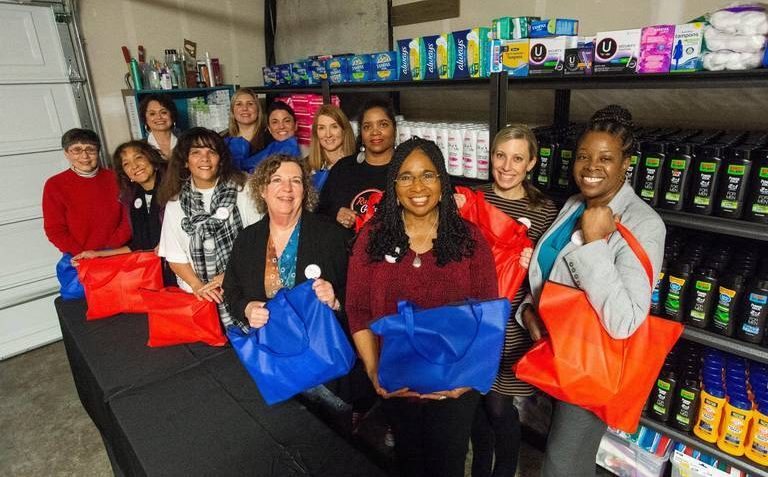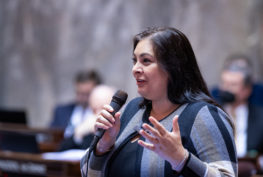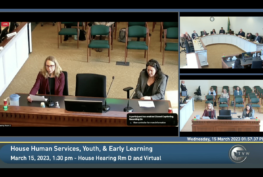From The News Tribune
“I was in the middle of a class … what is happening to me?,” Winesberry recalled. “Absolutely no supplies whatsoever to take care of myself … It was so devastating.”
The experience drove Winesberry, now 65, to volunteer for Raising Girls, a Tacoma nonprofit that aims to overcome the costs and stigma of menstruation for school-aged girls.
The 57-year-old Jamaica-raised woman said she’s had a life-long streak of giving back to her community, instilled by her mother. Although she was aware of “period poverty,” as it’s sometimes called, she didn’t realize the magnitude of need in the Tacoma area until her then middle school-aged daughter related stories from her schoolmates.
Raising Girls centers itself around the distribution of large tote bags that contain menstruation products, shampoo, conditioner, lotion, toothpaste, tooth brush, wash rags, deodorant, a small carrying bag and a handwritten note of encouragement.
Each bag contains about two months of supplies, Chambers-Gordon said.
The need for the bags is great, she said. 2018 census data identified 7,500 girls in the South Sound who live in low-income households in Pierce County.
Low-income families will put rent, food, medicine and other necessities ahead of hygiene products if money is tight, Chambers-Gordon said. Food stamps do not cover such products.
“If you are working minimum wage, maybe even two or three jobs, it doesn’t give you enough to pay your basic rent, have transportation to go to work and buy hygiene products,” she said.
When a girl is having her period but can’t afford tampons or pads, she’s likely to just stay home, at least one study has shown.
“A school nurse may have a pad or two but when (the girls) go home they don’t have access to that,” Chambers-Gordon said.
In addition to a degraded education, a girl’s social connections can suffer when she’s in self-imposed isolation.
Middle school and high school girls can get the care bags at six middle schools and five high schools in the Tacoma Public Schools system. All were identified as having high needs, Chambers-Gordon said.
Raising Girls also delivers care bags to local service organizations including Boys and Girls Club of South Puget Sound and the Tacoma Urban League. The bags and hygiene products also are provided to girls in foster care and the juvenile justice system.
About 200 of the care bags were distributed at two Boys and Girls Club branches in 2019, said spokeswoman Jinnie Horan.
“When the girls received them, they lit up,” Horan said. “It was the breadth and the scope of the items inside. It wasn’t just a hygiene kit, it was a pretty girl kit. It had things that made them feel good and smell good.”
Girls were impressed with the name brand items and the personal touches, Horan said.
“Something that stood out for them were the hand written notes,” she said. “That meant a lot to them.”
CARE BAGS
On a recent January evening, Chambers-Gordon’s two-car garage was filled to the ceiling with packed bags and neatly arranged shelves holding the products that go into them. Except for her vehicle, there was room for little else.
Blue bags with menstrual pads go to middle school girls, red bags with pads and tampons are for high school girls and a smaller number of black bags — minus the feminine hygiene products — go to boys.
Upstairs, Winesberry and the 12 other women who serve on the group’s leadership team, were writing thank-you notes to donors.
Chambers-Gordon launched Raising Girls in 2017. A real estate broker, she pursues her avocation after hours.
At first, she and her like-minded helpers spent their own money. Now, they solicit donations.
In 2019, the group distributed 1,500 bags. For some schools, they have become an integral part of the safety net.
“These bags are vital for students who lack the means — or simply did not anticipate the need — to have access to products vital to their health and hygiene while allowing them to stay focused on school,” said Lincoln High School principal Pat Erwin.
Raising Girls’ work is starting to get notice beyond the school setting.
In December, the organization was given a BECU People Helping People Awards. The grant — $54,400 — was the largest given, and it tripled Chambers-Gordon’s budget overnight.
The cash will go a long way to increasing Raising Girls’ mission, but it’s still short of what Chambers-Gordon estimates she needs to supply those 7,500 girls and some boys six times per year in Pierce County: $1.2 million.
Raising Girls also is pushing for the end of the so-called “pink tax” or “tampon tax” — the tax on feminine hygiene products. Washington is one of 37 states that impose the tax.
Changes to taxes would come from legislative action. In the meantime, a state senator is working on the issue from a different angle.
Sen. Manka Dhingra (D-45th District) has introduced Senate Bill 6037, which aims to require public schools to provide feminine hygiene products at no cost in the schools’ bathrooms.
Dhingra said she was spurred to action after a presentation by girls at Lake Washington High School in Kirkland. Like a lot of girls around the nation, they were forced to ask the school nurse for emergency supplies.
“We don’t ask people to go to the school nurse to get toilet paper,” Dhingra said. “Why would we ask them to get feminine hygiene products from the nurse?”
The bill has bipartisan support, she said. A hearing will be held Friday, Jan. 17. Dhingra expects students to testify.
Funding for the bill would not come from the state. Instead, Dhingra hopes to work with corporations or non-profits like Raising Girls.
“It really is about normalizing the human body and getting rid of the stigma,” Dhingra said.
HOW YOU CAN HELP
▪ Donate to Raising Girls: raisinggirls.org
▪ Host a donation drive or bin to collect personal hygiene products.
▪ Write inspirational cards for girls.
▪ Host a packing party.
▪ Sponsor a school supported by Raising Girls.




